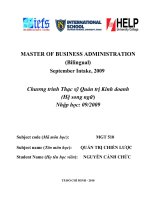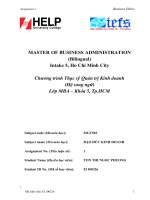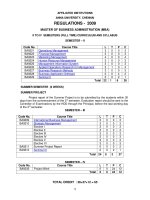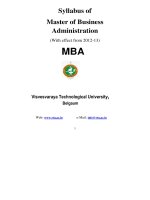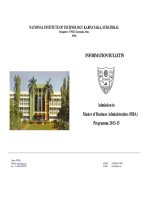Master of Business Administration MBA (Regular) Semester Scheme doc
Bạn đang xem bản rút gọn của tài liệu. Xem và tải ngay bản đầy đủ của tài liệu tại đây (323.46 KB, 71 trang )
Master of Business Administration
MBA (Regular) Semester Scheme
Detailed Syllabus
Code No.
M- 101
M-102
M-103
M-104
M-105
M-106
M-107
M-108
M-201
M-202
M-203
M-204
M-205
M-206
M-207
M-208
M-301
M-302
M-401
M-402
M-403
M-404
Name of Subject
Semester-I
Principles and Practice of Management
Organizational Behavior
Quantitative Technique for Management
Managerial Economics
Management Accounting-1
Marketing Management
Business Environment
Computer Applications in Management
Semester-II
Human Resource Management
Financial Management
Management Accounting-2
Operation & Production Management
Research Methods in Management
Information Technology for Management
Seminar on Contemporary Management Issues
Comprehensive Viva-voce
Semester –III
Summer Training Project Report
Business Policy & Strategic Management
Semester –IV
Business ethics and Ethos
Project Management
Business Laws
Project Study
List of Optional Groups for MBA (Third & Fourth Semester)
Group A [FINANCE]
M-303
M-304
M-305
M-306
Investment Management & Security
Analysis
International Financial Management
Marketing of Financial Services
Finance for strategic decisions
M-405
M-406
Financial Derivatives
Portfolio Management
Group B [MARKETING]
M-307
M-308
M-309
M-310
M-407
M-408
Advertising Management
International Marketing
Sales & Distribution
Management
Product & Brand Management
Consumer Behavior & Market
Research
Marketing of Services
Group C [HUMAN RESOURCE MANAGEMENT]
M-311
M-312
M-313
M-314
M-409
M-410
Training & Development
Organizational Change and
Intervention Strategies
Human Resource
Development: Strategies and
Systems
Human Resource Planning and
Development
Organizational Dynamics
Performance Management &
Retention Strategies
Group D [PRODUCTION AND OPERATION MANAGEMENT]
M-315
M-316
M-317
M-318
Material Management
Total Quality Management
Production Planning & Control
Operations Research
M-411
M-412
Logistics Management
Service Operations
Management
Group E [GENERAL MANAGEMENT AND SMALL &
MEDIUM ENTERPRISES]
M-319
M-320
M-321
M-322
M-413
M-414
Business Entrepreneurship
Public Enterprise Management
Entrepreneurial Development and
New Enterprise Management
Small Business Environment and
Management
Competitive Strategy
Corporate Governance
Group F [INFORMATION TECHNOLOGY MANAGEMENT]
M-323
M-326
Business Process Reengineering
System Analysis and Design
Strategic Management of
Information Technology
Data Base Management
M-415
M-416
Management Support System
E-Business
M-324
M-325
Group G [INTERNATIONAL BUSINESS]
M-327
M-330
Strategies of Multi National
Companies
International Business
Environment
Strategic International
Management
Export – Import Management
M-417
M-418
Intellectual Property Rights
International Marketing
M-328
M-329
Group H [TOURISM AND HOTEL MANAGEMENT]
M-331
M-332
M-333
M-334
M-419
M-420
Introduction to tourism
Airlines Management
Management of Travel agency and
Tour management
Legal and regulatory Framework of
tourism.
Hotel Management
Field study and project report: Event
and conference management.
M-101
Principles and Practice of Management
Course/Paper : 101
MBA Semester-I
Max.Marks : 70
Time : 3 Hrs.
Objective:
This course provides the student with an understanding of how the philosophy of management
underlies the MBA course taught on the programme. The objective of this paper is to familiarize
the student with basic management concepts and behavioral processes in the organisation. The
course will be an introduction to the way in which a firm can develop its managerial thinking,
mission and strategy. It will enable students to evaluate and analyse a firm’s management
philosophy, to understand the impact this philosophy has on the organisation and operation of the
business.
Section A
Management an Overview, Management Defined, Functions of Management, Managerial Roles
and responsibilities, System and Contingency Approach for understanding organisations,
Management Thought-Classical Perspective, Scientific Management, Administrative
Management, Bureaucratic Management, Behavioral Perspective. Managerial processes,
functions, skills and rules in an organisation, social responsibilities of Business.
Fundamentals of Planning - Objectives, Strategies, Policies, Decision making.
Fundamentals of Organising- Nature and purpose, departmentation, Span of Management,
Strategic organising design, line and staff authority and decentralization.
Direction-concept, Leadership- Meaning and Importance, transitions in leadership theories, trait
theories, behavioral theories, contingency theories, leadership styles and skills, managerial
culture and leadership. Coordination.
Control- concept, nature and purpose, control technique, control of overall performance, span of
control.
Section-B
Case Study
M-102
ORGANIZATIONAL BEHAVIOUR
Course/Paper : 102
MBA Semester-I
Max.Marks : 70
Time : 3 Hrs.
Objective:
The paper aims to present the basic concepts of management. The objective is to help student
comprehend perceive and understand dynamic nature of groups, Provide on insight into
behaviour of individuals in organization and the changing environment of organizations. This is
with a view to enable him to develop and adopt effective strategies to influence it. It also aims to
help the student develop decision making skills through case discussions.
Section -A
Organizational Behaviour - Definition – assumptions- - significance, - Historical Background Fundamental concepts of OB, research foundation, trends, impact of globalization, learning
organisation and Knowledge management.
Individual Behaviour and Managing diversity: individual behaviour, main reasons impact,
trends and layers of diversity; demographic differences, barriers and challenges, competitive
advantages, diversity initiatives. Personality Development: meaning, theories of Personality
development, managerial consideration for further developing of personality development of
employee. Perception –Meaning and definition, Perceptual process, Managerial implications of
perception in business situations, schemas, perceptual errors.
Motivation: nature and importance, basic process, need theories of motivation- the concept of
needs, Maslow’s hierarchy of needs theory, Alderfer’s ERG theory, Mc Cleland’s Achievement
Motivation Theory, Cognitive and behavioral theories- expectancy,. Equity, goal-setting theories.
Communication: Meaning, importance, process, types, effective and efficient communication,
barriers in communication.
Group Behaviour: Group formation: formal and informal group, stages of group development,
group decision making, group effectiveness and self managed teams.
Conflict and stress management: meaning, process, functional and dysfunctional conflict,
conflict handling, nature causes and consequences of stress.
Management of change: concept, Lewin’s stages of change, forces of change, resistance to
change, and managing planned change.
Section-B
Case Study.
M-103
QUANTITATIVE TECHNIQUES FOR MANAGEMENT
Course/Paper : 103
MBA Semester-I
Max.Marks : 70
Time : 3 Hrs.
Objective:
The objective of the course is to equip the student with basic quantitative tools required to
perform the role as a manager. This will enable him to do analytical evaluation and arrive at
logical conclusions & inferences to the decisions.
Section-A
Intorduction to Quantitative Techniques. Concept Model Building for Business Decisions. Role
and Scope Models in Business and Industry. Matrix Algebra Determinations. Solving linear
equations by using matrices. Applications of Matrices to value Analysis. Output Model in
Matrices. Basic concepts of differentiation. Theories of Extremes.
Linear Programme, Problem formulation and geometric methods of solution. Simplex method.
Two phase method, Elementary ideas about duality. Elements of Statistics Probability.
Probability Distributions Binomial, Possion and Normal. Correlation and Regression.
Decision Theory, Decision making under uncertainty, Criterion of Maximum, Min., Maxmin and
Minmax. Decision making under risk Bayesian approach. Criterion of Maximum likelihood.
Decision Tress-Applications, decision making in a Competitive Situation-Game Theory-Types of
Games. Two person zero sum games. Mixed strategy. Method of solution.
Section-B
Cases and Problems.
Note: 50% of the questions will be application oriented.
M-104
MANAGERIAL ECONOMICS
Course/Paper : 104
MBA Semester-I
Max.Marks : 70
Time : 3 Hrs.
Objective:
With economies becoming increasingly market oriented, it is becoming important for players in
the market place to learn to conduct themselves in a manner that will assure them of success. The
objective of the course is to provide insights into these aspects. Students of management must be
exposed to the time tested tools and techniques of managerial economics to enable them to
appreciate their relevance in decision making.
Section-A
Nature and Scope of Managerial Economics, role and Responsibility of a Managerial Economist.
The fundamental concepts of Managerial Economics, theory of the firm and the role of profits
Theory of Demand- concept, determinants of Demand, Demand Function and econometric
techniques. Theory of Supply- concept, determination, analysis, supply function. Elasticity of
Demand- concept, measurement. Concept of Consumer's surplus.
Analysis and costs estimation-economic Concept of Cost, Different Types of Cost: Managerial
uses of cost Function; Production Function to cost function-long run and short run total cost,
Break-even Analysis Make or Buy Decisions.
Market structure and pricing decisions-the competitive and monopoly model, monopolistic
competition and oligopoly, pricing of multiple products.
National income-concept and measurement. Business cycles, fiscal policy, Inflation. The new
economy-definition and characteristics.
Section-B
Case study.
M-105
MANAGEMENT ACCOUNTING-I
Course/Paper : 105
MBA Semester-I
Max.Marks : 70
Time : 3 Hrs.
Objective:
The objective of the course is to enable the student to familiarize with the preparation and
calculation knowledge of management accounting. The student will be able to understand the
system of utilizing financial, costing, and other information to assist the management in the
performance and evaluation of their functions.
Section -A
Introduction to Management Accounting – Origin, scope, functions and principles.
Understanding Indian Corporate Sector. Management Accounting- Understanding basic
financial accounting, Preparation of Final Accounts- as a backdrop to management accounting
and Cost Accounting. Changing role of management accounting and recent developments.
Management accounting and corporate governance.
Financial statement analysis- Ratio analysis- types and calculation. Comparative and common
size financial statement.
Analysis of Corporate Performance: Preparation and calculation of Fund Flow and Cash Flow
statement as per AS-3.
Basic Cost Concept, Cost sheet Cost-Volume-Profit Analysis, Budgetary Control. Marginal cost
and CVP Analysis and Profit planning. Activity based costing,
Section-B
Cases/Problems.
Note: 50% of the Questions will be Numerical/Cases/Inferences based.
M-106
MARKETING MANAGEMENT
Course/Paper : 106
MBA Semester-I
Max.Marks : 70
Time : 3 Hrs.
Objective:
Marketing is no longer a company department charged with a limited number of tasks- it is a
company wide undertaking. It drives the company’s vision, mission and strategic planning.
Marketing succeeds only when all departments work together to achieve goals. The student will
be able to understand these concepts.
Section-A
Understanding Marketing Management-Importance and scope. Marketing strategies and plansmarketing and customer value. Marketing insights-information and scanning the environment,
analyzing the macro environment. Rural Marketing: The profile of rural market of India. The
main problem area in rural marketing, channel Management in rural markets, marketing
communication in Rural Markets, Market Segmentation in rural market.
Consumer Behavior and market segmentation- Targeting and positioning as per the changing
pattern of Indian consumers-levels of market segmentation, segmenting consumer markets,
market targeting. Product Life Cycle Strategy, New Product Development Strategy.
Management of Marketing Efforts: building brands-dealing with competition, competitive brand
strategy. Product Policy and Pricing decision, Channels of distribution.
Managing the Marketing programme-advertisement, sales promotion, direct marketing and
personal selling, interactive marketing (E-Marketing) Marketing Research and Information
System.
Section-B
Case Study
M-107
BUSINESS ENVIRONMENT
Course/Paper : 107
MBA Semester-I
Max.Marks : 70
Time : 3 Hrs.
Objective:
The primary objective of this course is to acquaint the students to the emerging trends in business
environment. This will also help them to develop the ability to analyse the competitive business
environment to appraise the environmental pressures on business, and to understand the
government policies and current issues in Indian perspective.
Section-A
Business Environment – Nature, Concept and Significance of Internal environment.
Management of organisational resources for developing effective Internal organisational
environment, introducing organisational change when this equilibrium is found.
External Environment-nature and significance - Economic, Socio- Cultural, Political and
Technological factors influencing Business Environment - Changing role of Government Structure
of
Indian
Economy.
Economic environment-types of economic systems, impact of liberalisation and privatization on
Indian economy. Critical evaluation of latest economic policies of India, role of Indian business
houses in the world. Multinational Corporations - Foreign Collaborations
Political environment- Types of political systems, role of political organisation of India to
development of economy.
Social Responsibilities of Business - Business Ethics - Developing Ethical Business Habits Work Ethos in Indian Perspective - Indian Heritage - Relevance of values in Management
Government of India’s Commercial Banking, Exim and Technology policy, Approach to Foreign
direct Investment. Government policy regarding small sector enterprises.
Section-B
Case Study.
M-108
COMPUTER APPLICATION IN MANAGEMENT
Course/Paper : 108
MBA Semester-I
Max.Marks : 70
Time : 3 Hrs.
Objective:
This course is designed to make the students of management familiar with the basic
fundamentals and concept of computer. This paper shall prepare students to learn and acquire
necessary computer skills required for day to day office application. The students will also be
able to learn to solve business mathematical problems with the aid of computers.
Section-A
Introduction to computers- definition, a simple model of computer, fundamental, technical and
commercial classification of computer. Characteristics of computer systems.
Data representation and application- input and output devices, Computer Memory, CPU, Types
of Software - Application software, System Software-Operating systems and types. Softwares,
Application Software’s Languages
Windows and its applications-Windows Operating System. Elements of Desktop, Application
Window. Document Window, Special Indicators. File Handling in Windows, Accessories
MS Office and its application-MS Office Fundamentals & Components Excel.MS Power Point, MS- Access.
MS Word, MS
Advantage and Disadvantage of IT Outsourcing, Telecommunication Concepts, Data
Transmission and OSI layers, Local Area Network (Ethernet, Token bus, Token ring) Wide Area
Network, TCP/IP fundamentals, Internet, Intranet, Extranet, The World-Wide Web.
Data Base Management System-Data Base Management System Objectives of Data Base.
Advantages & Disadvantages of DBMS.Hierarchical Model, Network Model, Relational Model.
Normalization Process, Advance Technologies in Data Base Technology. Object-Oriented DB,
Distributed DB, Client Server Systems
Section-B
Case study.
M-201
HUMAN RESOURCE MANAGEMENT
Course/Paper : 201
MBA Semester-II
Max.Marks : 70
Time : 3 Hrs.
Objective:
To become a successful manager of people, students need to understand behaviour of human
resources in various organisational situations. In a complex world of industry and business,
organizational efficiency is largely dependent on the contribution made by the human resources
of the organization. The objective of this course is to sensitize students to various facts of
managing people and to create an understanding of the various policies and practices of human
resource management.
Section-A
Human Resource Management-. Introduction and Scope, HRD-Concept, Need, Human Resource
Planning-Concept, Process, job design-Concept approaches, job analysis, job description, job
specification. Human Resource Procurement-Recruitment. Selection and induction.
Training, Training phases, Need Assessment, Establishment, Establishment of Training
objectives, Training method Lecture, case method, Role playing. Business in Basket T- Group,
Incident, Syndicate, Evaluation of a training Programme. Performance measurement and reward
systems-introduction, performance drivers, leadership and performance, reward management
performance appraisals. Discipline. The grievance procedure.
Employee compensation-purpose and importance, components. non monetary rewards, workers
participation in Management Employee. Strategic challenges for leadership, career management,
SHRM Mergers and acquisitions.
Section-B
Case/Problems.
M-202
FINANCIAL MANAGEMENT
Course/Paper : 202
MBA Semester-II
Max.Marks : 70
Time : 3 Hrs.
Objective:
The focus in this paper would be on issues related to financial management in the Indian
Corporate Sector. The contents are related to the practices observed in Indian Corporate Sector.
The objective is to enable and equip the manager with basic tools for applying financial analysis.
Section-A
Meaning, Importance and Objectives of Financial Management; Time value of money; Conflicts
in profit versus value maximization principle; Functions of chief financial officer.
Risk and Return- overview of capital market theory, Beta Estimation, CAPM, and APT.
Management of working capital; Cash and Marketable securities management; Treasury
management, Receivables management, Inventory management, Financing of working capital.
Investment decisions: Capital budgeting- concept, theory. Cost of capital. Risk analysis in
capital budgeting.
Financing decisions: Concepts of operating and financial leverage; Capital structure Theory and
Policy; Dividend Policy .Different sources of finance: Asset Based financing- Lease, Hire
Purchase and Project Financing. Corporate Restructuring, Merger and Acquisition.
Section-B
Case/Problems
Note: 50% of the question will be numerical.
M-203
MANAGEMENT ACCOUNTING-II
Course/Paper : 203
MBA Semester-II
Max.Marks : 70
Time : 3 Hrs.
Objective:
The objective of the course is to provide the students with a learning framework that will enable
them to study the principles and procedures used in collection and analysis of accounting
information.
Section –A
Management Accounting-Introduction. Basic cost terms and concepts. Managerial implications
of job order costing, process costing- simple process, process accounting of normal and
abnormal wastage, Process Stock Accounting and inter process accounting.. cost-volume-profit
analysis. Cost reduction system-kaizen costing system, ABC, Life cycle costing. Pricing
decision. Standard cost and variance analysis.
Budgeting and budgetary control-Types of budget- Flexible, cash, sales, production budget,
master budget. Managerial implication of budget, performance budgeting, ZBB.
Inferences from published financial statements-Ratio, cash flow and funds flow.
Emerging issues in Management Accounting-Human Resources Accounting, EVA, Internal
Reconstruction and Amalgamation – concept, elementary accounting and interpretation.
Section
–B
Cases/Problems.
Note: 60% of the Questions will be Numerical/Cases/Inferences based.
M-204
OPERATIONS AND PRODUCTION MANAGEMENT
Course/Paper : 204
MBA Semester-II
Max.Marks : 70
Time : 3 Hrs.
Objective:
The Course is designed to acquaint the students with decision making in : Planning, scheduling
and control of Production and Operation functions in both manufacturing and services;
Productivity improvement in operations thought layout engineering and quality management etc;
Effective and efficient flow, replenishment and control of materials with reference to both
manufacturing and services organisations.
Section-A
Operation Management-Introduction. Operation Research and operation strategy, forecasting
demand and Linear regression, transportation and assignment problems, allocation of resources.
Nature and Scope of Production Management- process planning and design Facility Location;
Types Manufacturing Systems & Layouts; Layout Planning and Analysis Material HandlingPrincipals-Equipments, Line Balancing-Problems Operations decisions-Production Planning and
Control -In Mass Production in Batch/Job Order Manufacturing.
Capacity Planning -Models, Process Planning-Aggregate Planning-Scheduling Maintenance
Management Concepts-Work Study, Method Study, Work Measurement, Work Sampling Work
Environment-Industrial Safety; Computer aided Manufacturing (CAM), Artificial Intelligence &
expert systems.
Material Management -an Overview, production control, storage and retrieval System. Inventory
Control- JIT .Network Techniques-Simulation
Concept of total Quality (TQ). International Quality Certification and other standards and their
applicability in design manufacturing Humanistic and Marketing Aspects of TQ. Total Quality of
services. Total Quality and safety. ERP and Business process engineering maintenance
Management, project management-PERT & CPM.
Section-B
Case study.
M-205
RESEARCH METHODS IN MANAGEMENT
Course/Paper : 204
MBA Semester-II
Max.Marks : 70
Time : 3 Hrs.
Objective:
The objective of the course is to enable the students, in developing the most appropriate
methodology for their research studies and to make familiar with the art of using different
research methods and techniques.
To understand the concept and process of Business research in business environment. To know
the use of tools and techniques for exploratory, conclusive and causal research. To understand
the concept of measurement in empirical systems & its validity and reliability. To use statistical
techniques for analysis of research data. To realize the applications of Business research.
Section –A
Concept of Scientific Enquiry - Formulation of Research Problem Hypothesis Building
Characteristic and Testing, Review of Literature, Research Design-Exploratory, Descriptive and
Experimental research Design. Qualitative Research Design. Data Collection -Sources,
Constructing a questionnaire. The Interview, Observation and Survey. Sampling Decisions,
Probability and Sampling.
Parametric and Nonparametric test, level of Significance, using software for analysis Grouping
and displaying data to convey meaning: Tables and Graphs, measures of Central tendency and
dispersion in frequency distributions, Probability distributions, and Testing hypotheses
One sample test and two sample tests, chi-square and analysis of variance, Simple regression and
correlation, Non-Parametric methods - the sign test for paired data, the rank sums test. The
mann-whittney U test, the one sample Runs test, rank correlation.
Attitude Measurement- Motivational Research, Focus Group; Scaling Techniques- Socio Metric
and Rating Scale, Scalograms, Internal Consistency Scales. Report Writing Organization
Presentation, Bibliography and References.
Section-B
Cases and Problems.
M-206
INFORMATION TECHNOLOGY FOR MANAGEMENT
Course/Paper : 206
MBA Semester-II
Max.Marks : 70
Time : 3 Hrs.
Objective:
The course is an introduction of computer architecture, networks and software tools. This will
help students to understand the role of information systems and technology with current business
and management application.
Section-A
Information & System Concepts-Introduction --Concepts, Classification of Information, Methods
of Data & Information Collection, Value of Information, Organization and Information, System:
A Definition. Types of Systems, System Decomposition, Integration of Sub Systems, Elements
of a System, Human as an Information Processing System. International Business and IT.
Management Information System-MIS: Definition, Nature & Scope, MIS Characteristics,
Functions, Structure of MIS, Role of MIS, MIS as a Control System, Process of Management,
Application of MIS, ERP & IT’s Benefits.
Internet-Introduction to Internet, Why We Need Internet, Internet Tools & Services, www,
Internet in India, Security, Web Browser, Future of Internet,E-Comm. an Introduction, EBusiness Fundamentals.
New Information Technology: Interconnection and networking, Multimedia, Neural Networks,
Artificial Intelligence, Executive Information System, Decision Support System (DSS) and
Expert Systems.
Issues for Senior Management: Management Control, Management Issues, Security Issues:
Viruses, Worms and other creatures, I T issues for Management, Management in a Technological
Environment,
the
changing
world
of
Information.
Section-B
Case Study.
M-207
SEMINAR ON CONTEMPORARY MANAGEMENT ISSUES
Course/Paper : 207
MBA Semester-II
Max.Marks : 100
M-207 is on Seminar on Contemporary Management issues. Here the faculty members
will assign contemporary issues concerning with Indian Corporate sector like, merger &
acquisition, current economic issues, global interface, stock market developments, new
HR initiatives, recent trends in marketing trends etc, to the students. The student will
prepare seminar under guidance of faculty members to be allotted by the director/
Principal of the institute. There will be no internal assessment. The student will submit
written report and make an oral presentation before a panel of internal examiner
(Director/ principal of the institute or his or her nominee) and external examiner (to be
appointed by director/principal of the institute from a panel proposed by the board of
studies and approved by the vice chancellor of RTU.) THE assessment of the report and
its presentation will be jointly done by the internal and external examiner.
M-208
COMPREHENSIVE VIVA-VOCE
Course/Paper : 208
MBA Semester-II
Max.Marks : 100
The performance e of the student at comprehensive viva examination will be done by a
panel of internal and external examiner. The candidate will be examined in the papers
which he/she studied during semester 1st and semester 2nd . There will be no internal
assessment. The student will make an oral presentation before a panel of internal
examiner (Director/ principal of the institute or his or her nominee) and external examiner
( to be appointed by director/principal of the institute from a panel proposed by the board
of studies and approved by the vice chancellor of RTU.) THE assessment of the report
and its presentation will be jointly done by the internal and external examiner.
M-301
SUMMER TRAINING PROJECT
Course/Paper : 301
MBA Semester-III
Max.Marks: 100.
The summer training project report will be evaluated on internal and external basis.
Evaluation and presentation of the report will be done by internal and external
examiners. The student will submit written report and make an oral presentation before a
panel of internal examiner (Director/ principal of the institute or his or her nominee) and
external examiner (to be appointed by director/principal of the institute from a panel
proposed by the board of studies and approved by the vice chancellor of RTU.) The
assessment of the report and its presentation will be jointly done by the internal and
external examiner.
M-302
BUSINESS POLOCY AND STRATEGIC MANAGEMENT
Course/Paper : 302
MBA Semester-III
Max.Marks : 70
Time : 3 Hrs.
Objective:
The objective of the course to equip the students with analytical tools for Cracking case studies
by scanning the business environment and coming to a decision. The students will benefit by
acquiring new ways and means of developing strategic decision making skills.
Section-A
Business policy-evolution of the concept. Difference between business policy and strategic
management. Corporate governance- concept, issues, models, evolution and significance.
Introduction to Strategic Management-Concept importance of strategic Management, Strategy &
Competitive Advantage, Strategy Planning & Decisions, strategic Management Process
Establishing company direction-developing strategic vision, setting objectives and crafting a
strategy-Internal & External Environment, Formulating Long Term objective & Strategy,
Strategic Analysis & Choice.
Industry and competitive analysis, strategy and competitive advantage, Principles of Competitive
Advantage-Identifying Value Activities, Competitive Scope and the Value Chain, the Value
Chain and Generic Strategies, Mergers & Acquisitions Strategies.
Strategy Implementation-Operationalising & Structure of strategy, Resource Management and
Control, Ethics, Public Values & Social Responsibility
Challenges in the New Millennium-Managing change, Effects of Power & Politics on Strategic
Changes, Global Competitiveness in the New Millennium
Section-B
Case Study.
M-401
BUSINESS ETHICS AND ETHOS
Course/Paper : 401
MBA Semester-IV
Max.Marks : 70
Time : 3 Hrs.
Objective:
This course aims at helping students think about some of the important ethical Implications of
the day-to-day happenings and practices of Indian industry and business. It is designed to
stimulate discussion and debate rather than to formulate principles, and to raise further questions
rather than to dictate answers. The following objectives are underlined: To improve ethical
reasoning by correlating moral concepts to business practices - clarification of the values that
determine managerial behaviour. To sensitize the fundamental human values in analysing social
problems and appraising global issues. To recognise the variables in most ethically complex
business situations through an understanding of the more subtle criteria for making sound
decisions.
Section- A
The Concept: The dream of an Indian Style of Management, Abiding Values is Universal,
Intuition Vs Reason, Human Values and Economic Prosperity: Reconciliation via Indian Insight.
Individualistic: Rational Brain Vs Holistic-Spiritual Brain. Total Quality Mind for Total Quality
Management: The Imperative of Human Values.
Group Ethics- Ethical Attitudes of Indian Managers, Managers Facing Unethical Management,
Discussion: Group-think and Unethical Behaviour.
Marketing Ethics- Discussion: Bluffing in Indian Marketing Practices, Ethical Issues in
Advertisements. Ethics in Finance: Ethics in Tax Planning and Financial Statements. Discussion:
Speculation and Insider Trading
Ethics & the Organisation :Unity : The Basis of Ethics, Science & Ethics, Technology & Ethics,
Subjective Ethics in an Objective Age, Business Ethics, Normative Ethics, Managing Ethics,
Cooperative Ethics,Indianism and Indian Management, Indian Ethos for Management. Relevance
of Gita to Modern Management.
Section -B
Case study
Cases: Ethical Dilemmas, a Tryst with Truth, an Island of Excellence, Creating Awareness about
our Culture, the Overtime Imbroglio and its Fallout, Word for Reward.
Need for Values' in Global Change- Indian Perspective; Values for Managers; Holistic Approach
for Managers in Decision Making; Secular versus Spiritual Values in Management.
M-402
PROJECT MANAGEMENT
Course/Paper : 402
MBA Semester-IV
Max.Marks : 70
Time : 3 Hrs.
Objective:
Since the introduction of planning in India, the country has been investing we have been
investing large amounts of money in projects. It is necessary to have scientific and systematic
management in project planning, development and implementation. The course would provide a
valuable insight to students in the area to understand formulation of corporate investment
strategies, prepare feasibility reports and project.
Section A
Planning: overview, Concepts of Project, Project life cycle, Project Formulation, Project
Feasibility, analysis- Market, Technical, Financial, Project appraisal Criteria- NPV, IRR. Pay
back period, Sensitivity Analysis. LOB (Line of Balance), Network analysis, PERT, CPM,
Compression on critical path.
Cost Benefit Analysis –Projects procurement process, life cycle costing, project cost reduction
methods, project stores. Dynamics of project cost, estimation of capital cost, estimating operating
costs, forecasting income, financial sources, role of development financial institutions. Social
cost benefit analysis
Project Management Systems (PMIS); Project Audit, Ex-post Evaluation.
Section B
Case and Problems
M-403
BUSINESS LAW
Course/Paper : 403
MBA Semester-IV
Max.Marks : 70
Time : 3 Hrs.
Objective:
The objective to appraise the student with the thorough understanding of laws and rules so that
business could be comprehended entirely. This paper provides a holistic view of different acts
and ordinances pertaining to the discipline of management.
Section A
Indian Contract Act, 1872-Essential Elements of Contract, Void Agreements; Breach of
contracts & Remedies, Amendments.
Negotiable Instruments. Act, 1881-Promissory Notes, Cheques, Bills of Exchange
Sale of Goods Act, 1930-Contract of Sale, Transfer of Property; Sale by Non-Owner,
Performance of Contract.
Indian Company's Act, 1956-Meaning and Nature of Company, Kinds of companies,
Registration and Incorporation, Share and Share Capital, Investments Loans and Public Deposits,
Account and Audit.
Central Excise Act. Central Sales Act.-Tariff & Freight of Excise, Levy of Duty, Duty on
Branded Products, Valuation of Excise , Amendment 2002,Articles of Act ;determination of
Sales Tax, Rates of sales Tax, Import and Export; Penalty and prosecution.
Income Tax Act 1961-Income from Salaries; Income form other Property, Profit and Gains Capital Gains, Deductions, Profit & Loss
Section B
Case and Problems
M-404
PROJECT STUDY
Course/Paper : 404
MBA Semester-IV
Max.Marks : 200
Time :
Objective:
Paper M-404 is a paper on project study. The project is real life short term corporate
study. The candidate will be allotted the project by the faculty of the institute in
consultation with the director/principal of the institute. There will be external examiner to
be selected by the Director/Principal of the institute from the panel of examiners,
proposed by BOS and approved by the Vice Chancellor. The student will submit written
report and make an oral presentation before a panel of internal examiner (Director/
principal of the institute or his or her nominee) and external examiner (to be appointed by
director/principal of the institute from a panel proposed by the board of studies and
approved by the vice chancellor of RTU.) THE assessment of the report and its
presentation will be jointly done by the internal and external examiner.
List of Optional Groups for MBA (Third & Fourth Semester)
Group A [FINANCE]
M-303
SECURITY ANALYSIS AND INVESTMENT MANAGEMENT
Course/Paper : 303
MBA- Optional
Max.Marks : 70
Time : 3 Hrs.
Objective:
The focus of Security Analysis is on how others analyse your company’s securities on their own.
Whereas, that of Portfolio Management is on how investors analyse your company’s securities in
comparison with other’s on the security market. The course is designed with a view: To acquaint
the students with the working of security market and principles of security analysis; and To
develop the skills required for portfolio management so as to be able to judge the competitive
position of firms in capital market and review the related business decisions.
Section A
The Role of Security Markets in Economy. The Organization and Mechanics of Indian Security
Markets- Various Securities and their Characteristics, Objective of the Security Analysis,
functions of an Organised Security Market, Mechanics of Security Trading.
Various Types of Security Markets and their Functions- Stock Exchanges, OTCEI, Depository.
Role of SEBI with regard to Secondary Markets.
Concept of security analysis: Valuation of risk less and risky securities, capital asset pricing
model, arbitrage pricing theory, efficient market hypothesis, technical and fundamental analysis.
Concept and trends of savings and investment in India. Stock market: concept, functions,
regulations, working and reforms. Instruments of mobilizing investment: Types and
characteristics. Yield and factors affecting security prices. Stock market indicators and
terminology. Comparison of investment options.
IPO and secondary markets: reforms and trends, trading mechanism: on line trading, settlement
period.
Risk management system. Mark to market margin and intraday limit, circuit breaker, short sale
and long purchase, transaction cost in secondary markets, clearing settlement and depositories,
integration of stock exchange and consolidation of intermediaries, listing requirements.
Section B
Case and Problems
M-304
INTERNATIONAL FINANCIAL MANAGEMENT.
Course/Paper : 304
MBA-Optional
Max.Marks : 70
Time : 3 Hrs.
Objective:
The new economic environment has changed the total concept of business in the country.
Financial markets of the world are increasingly integrating. Financial opportunities have
increased manifold across markets. Almost all products and services face global competition.
To introduce the environment of international finance and its implications on international
business. To analyse the nature and functioning of foreign exchange markets, determination of
exchange rates and interest rates and their forecasting. To define and measure foreign exchange
risks and to identify risk management strategies. To explore the sources of long term finance and
design financial strategies. To integrate the global developments with the changing business
environment in India.
Section A
International financial management: Genesis international flow of funds. Developments in
international monetary system, exchange rate mechanism. Emergence of multinational financial
management. Balance of payment. Risk: political and country risk. Raising capital: international.
Intricacies of Foreign Exchange Markets- Spot and Forwards Exchange Rates, Eurocurrency and
Domestic Interest Rates, Quotations and market rules.
Parity conditions in International Finance- Purchasing Power Parity, Covered Interest Parity,
Real Interest Parity, Parity Conditions and Managerial Implications.
Analysis of International Capital Budgeting, Cost of Capital of a Foreign Investment
Forex risk management: Forex market, measuring and managing foreign exchange risk,
international financing and investment strategies, managing short term assets and liabilities.
Section B
Case and Problems
